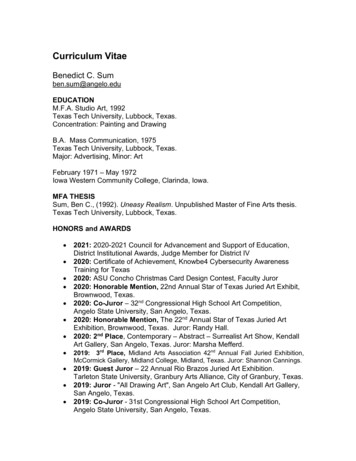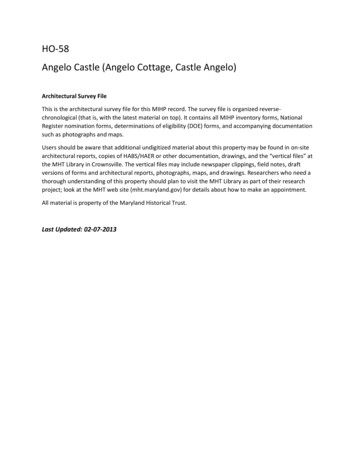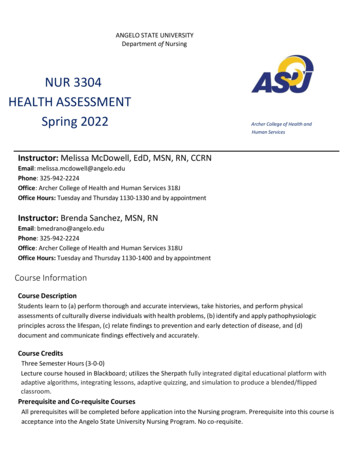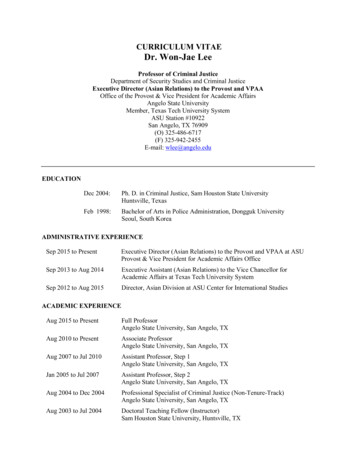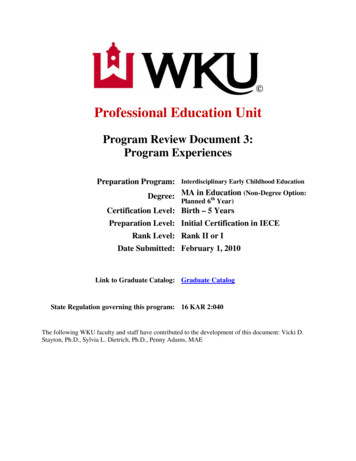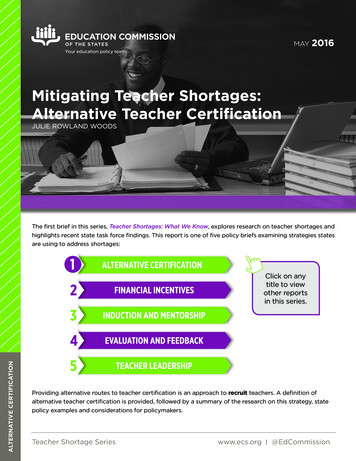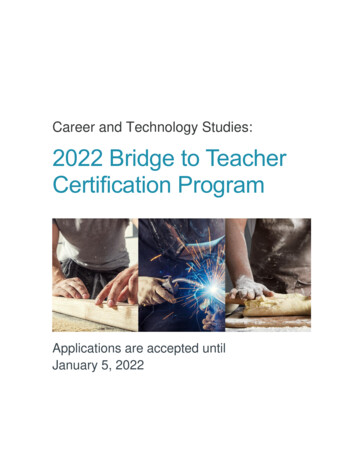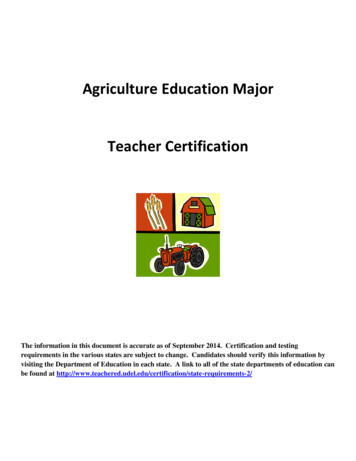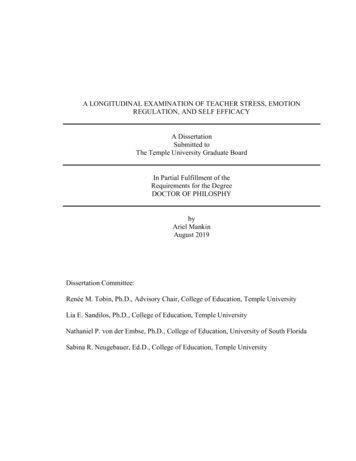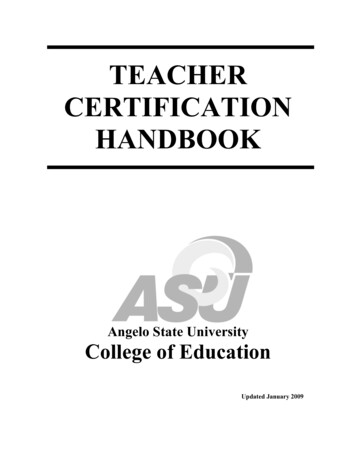
Transcription
TEACHERCERTIFICATIONHANDBOOKAngelo State UniversityCollege of EducationUpdated January 2009
TABLE OF CONTENTSWelcome from the Dean .3Educator Preparation Program Mission Statement .4Contact Information .5Certification Programs at Angelo State University .6Certification Requirements .8Angelo State University Requirements.8State Board of Educator Certification Requirements.8Associated Certification Costs.8Educator Preparation Program.8Admission Requirements .8Candidate’s Statement of Commitment Regarding Dispositions .9When to Apply.10Online Application.10Appeals Process .10Pre-Student Teaching Field Experiences .11Guidelines .11Online Application.11Student Teaching Program.12Admission Requirements .12When to Apply.13Application Process .13Appeals Process .14Expected Learner Outcomes .15Interstate New Teacher Assessment and Support Consortium (INTASC).15Texas Beginning Teacher Support System (TxBESS) .16TaskStream Online Portfolio Program.17State Board for Educator Certification (SBEC).18Routes to Certification .18Establishing an Account .18Applying for a Teaching Certificate .19Fingerprinting .19Certification Recommendation .19Adding Certification Fields.19Graduate Level Certification Programs .19Certification Examinations (TExES, TOPT) .20Test Approval Process .20Registration Information.20Registration Instructions .21Preparation Manuals .21Score Reporting .21Alternative / Nonstandard Testing Accommodations.21Certification Checklist .22Certification Acronyms.222
WELCOME FROM THE DEANThe College of Education at Angelo State University wishes to provide you withassistance that will enable you to become a certified teacher in Texas. The informationprovided in this document will facilitate your smooth transition through the EducatorPreparation Program at Angelo State University.We are pleased that you wish to become an educator and we are here to help you reachthat goal. You will have specific content, pedagogy, and field experience requirementsthroughout the program. These requirements will enable you to be successful during yourteaching career.The basic competencies necessary to be a successful beginning educator are representedby the Texas Beginning Educator Support System. The established competencies formthe evaluation of the beginning teacher at the end of the Educator Preparation Programand are the basis for mentoring new teachers by many school districts in Texas.As you progress through the Educator Preparation Program you will be introduced to theelements that meet the National Council for the Accreditation of Teacher Education(NCATE) standards. These national accountability-standards ensure that you areparticipating in a quality program of educator preparation. The foundation for ourprogram is stated in the Conceptual Framework found within this document and at theweb pages of the Educator Preparation Program. You will also be required todemonstrate a set of disposition behaviors that are demonstrated by highly effectiveteachers.We align all work within the Educator Preparation Program with the requirements set outby the Texas State Board for Educator Certification. We ensure that beginning educatorshave the knowledge and skills to begin classroom instruction from their first day in theclassroom. Our students not only are well prepared to pass their state licensureexaminations but they are well prepared to work with all students through their fieldexperiences throughout the program.Thank you for choosing Angelo State University’s Educator Preparation Program. Wewill strive to provide you with quality experiences that prepare you to teach in today’spublic schools.John J. Miazga, Ed. D.DeanCollege of Education3
ANGELO STATE UNIVERSITY’SEDUCATOR PREPARATION PROGRAMMISSION STATEMENTThe Angelo State University faculty prepares professional education leaders to have theknowledge, skills, and dispositions to meet changing societal needs in diverse school andcommunity settings. The Educator Preparation Program at Angelo State Universitydevelops reflective candidates who embrace student-centered learning in successfulpartnerships with diverse families, schools, and communities.The Educator Preparation Program is developingA New Generation of Educators Leading Others”“toward life-long learning.4
CONTACT INFORMATIONDean, College of Education Educator Preparation ProgramAdmissionPre-Student Teaching FieldExperiencesStudent Teaching InformationPost-Baccalaureate & Post-Master’sCertificationCertification Examination ApprovalApplying for Teacher CertificationGeneral Certification InformationEC-6 Generalist4-8 Generalist4-8 English Language Arts & ReadingSpecial Education EC-12 &SupplementGraduate Programs:o Educational Diagnosticiano Reading Specialisto Master Reading Teacher4-8 Mathematics4-8 Science4-8 Social StudiesGraduate Programs:o Curriculum & Instructiono Guidance & Counselingo School Administrationo Student Development &Leadershipo Superintendent8-12 Certification FieldsEC-12 (All-Level) Certification FieldsDr. John Miazga(325) 942-2212john.miazga@angelo.eduMs. Wendy StormsDirector of Field Experiences(325) 942-2520wendy.storms@angelo.eduMs. Cindy PondDirector of Certification & AccountabilityCollege of Education(325) 942-2209cindy.pond@angelo.eduDr. Linda LucksingerHead, Department of Education(325) 942-2052linda.lucksinger@angelo.eduDr. Jim SummerlinHead, Department of Curriculum &Instruction(325) 942 - 2647jim.summerlin@angelo.eduDepartment head of certification field (i.e.for History 8-12 certification, contact thehead of the Department of History)5
CERTIFICATION PROGRAMS AT ANGELO STATE UNIVERSITYThe following certification programs are offered at an undergraduate or postbaccalaureate level. Students who are degree-seeking undergraduates should contact theASU Department listed in the table to obtain degree information. Students who alreadyhave a degree (post-baccalaureate students) should contact the Certification Office in theCollege of Education to obtain information about non-degree certification plans.CertificateASU DepartmentArt (Grades EC-12)Art & MusicBilingual Education Supplement -SpanishModern LanguagesChemistry (Grades 8-12)Chemistry & BiochemistryComputer Science (Grades 8-12)Computer ScienceEnglish Language Arts and Reading (Grades 4-8)Teacher EducationEnglish Language Arts and Reading (Grades 8-12)EnglishFrench (Grades 6-12)Modern LanguagesGeneralist (Grades EC-6)Teacher EducationGeneralist (Grades 4-8)Teacher EducationGerman (Grades 6-12)Modern LanguagesHistory (Grades 8-12)HistoryJournalism (Grades 8-12)Communications, Drama & JournalismLife Sciences (Grades 8-12)BiologyMathematics (Grades 4-8)Curriculum & InstructionMathematics (Grades 8-12)MathematicsMathematics/Physics (Grades 8-12)Mathematics or PhysicsMusic (Grades EC-12)Art & MusicPhysical Education (Grades EC-12)KinesiologyPhysical Sciences (Grades 8-12)PhysicsScience (Grades 4-8)Curriculum & InstructionSocial Studies (Grades 4-8)Curriculum & InstructionSocial Studies (Grades 8-12)HistorySpanish (Grades 6-12)Modern LanguagesSpecial Education (Grades EC-12 & Supplemental)Teacher EducationSpeech (Grades 8-12)Communications, Drama & JournalismTheatre (Grades EC-12)Communications, Drama & Journalism6
GRADUATE LEVEL INITIAL TEACHER CERTIFICATION PROGRAMThe Master of Arts in Curriculum & Instruction is a degree program with an option toapply to the Educator Preparation Program for Teacher Certification. The certificationprogram is designed for those who have a bachelor's degree and are interested inteaching. You must have a bachelor's degree with 24 hours in Texas public schoolteaching field to begin the process. For more information about this program, pleasecontact the Department of Curriculum & Instruction.GRADUATE LEVEL PROFESSIONAL CERTIFICATION PROGRAMSThe following certificate programs are offered at a graduate or post-graduate level.They require initial certification as a classroom teacher and at least two years of teachingexperience depending on the certificate. Students who are seeking graduate degreesshould contact the College of Graduate Studies and the ASU Department listed in thetable to obtain degree information. Students who already have a Master’s degree (postMaster’s students) should contact the Certification Office in the College of Education toobtain information about non-degree certification plans.Educational Diagnostician (Grades EC-12)Teacher EducationMaster Reading Teacher (Grades EC-12)Teacher EducationPrincipal (Grades EC-12)Curriculum & InstructionReading Specialist (Grades EC-12)Teacher EducationSchool Counselor (Grades EC-12)Curriculum & InstructionSuperintendent (Grades EC-12)Curriculum & Instruction7
CERTIFICATION REQUIREMENTSIn order to be recommended for an initial teaching certificate, a student must have metthe following requirements:Angelo State University requirements: Complete all course and grade requirements for the certificate being sought. Complete the ASU Educator Preparation Program. Satisfactorily complete student teaching. Meet GPA requirements of 2.50 in the following areas: overall, in content areacoursework, and in professional education coursework.State Board of Educator Certification (SBEC) requirements: Possess a baccalaureate degree. Pass a national criminal background check through a fingerprinting process withSBEC. Pass all certification exams associated with the certificate being sought. Complete an online application.Additional CostsBesides university tuition and fees, there are additional costs associated with obtainingteacher certification: TExES Certification Exams - Students are required to take at least two exams. SBEC Certification Application Fee SBEC Fingerprinting Fee - There is an additional charge by the vendor whoperforms the fingerprinting.EDUCATOR PREPARATION PROGRAMAdmissions RequirementsCandidates apply for admission to the Educator Preparation Program (EPP) when theyhave completed 60 semester credit hours. Instructions for applying to the EPP areavailable on the College of Education cations.html).At the time of application to the Educator Preparation Program, all applicants mustdemonstrate that they have:1. Completed 60 SCH with a minimum cumulative grade point average of 2.50.2. Completed at least 12 SCH in the major/teaching field coursework with no gradelower than a C and a GPA greater than 2.50.3. Completed the coursework to demonstrate proficiency in reading, writing,mathematics, and communication. To demonstrate proficiency, the candidatemust complete the following with a grade of C or better:a. Reading - History 1301 and 1302, OR Government 2301 and 2302b. Writing - English 1301 and 13028
Mathematics - Mathematics 1302 or equivalent coursed. Oral Communication - Communication 2301 or 23314. Have met the requirements of the Texas Success Initiative (TSI). The TSI skillrequirements are normally met at the time of admission to the university orthrough required coursework. For more information about the TSI, visit theAngelo State University TSI website (https://www.angelo.edu/services/tsi/).5. Angelo State University’s candidates demonstrate acceptable teacher behavior.Candidates will be evaluated on these behaviors through the assessment of teacherdispositions. At the point of admission to the Educator Preparation Program,students are required to review and accept the unit’s dispositions.c.Candidate’s Statement of Commitment Regarding DispositionsThe Educator Preparation Program is responsible for preparing candidates who have therequired knowledge, skills, and dispositions to become effective teachers. Therefore, yourcertification program will prepare you to demonstrate the knowledge, skills, anddispositions expected of beginning teachers. Faculty and school personnel will evaluateyour demonstration of these dispositions and provide you with feedback about yourprogress.Dispositions are defined as the value, commitments, and professional ethics thatinfluence behavior toward students, families, colleagues, and communities and affectstudent learning, motivation, and development as well as the educator’s own professionalgrowth. Dispositions are guided by beliefs and attitudes related to value such as caring,fairness, honesty, responsibility, and social justice (NCATE, 2001). The dispositionslisted below are expected of ASU teacher education candidates in the universityclassroom and in the schools.Professionalism Timeliness is consistent in class, clinicals, and group work, appointments,completion of assignments. Attendance is consistent at class, clinicals, group meetings, appointments,student teaching and internships. Appearance and dress matches schools’ dress standards and expectationswhen candidate are present in the schools. Poise/attitude reflects proactive planning, preparation, and engagement inclasses and in the schools. Initiative is demonstrated by offering ideas and suggestions to others, settinggoals for self-improvement, seeking advice and feedback, and independentlysearching for, creating, or modifying plans and materials. Ethics is demonstrated by maintaining confidentiality about EC-12 studentsand their families, following the Code of Ethics for Texas Educators Integrity,disclosing any unlawful activity upon application to and during the teachereducation program that might adversely affect ability to obtain a teachinglicense, as well as passing criminal background checks and drug screeningrequired by the school systems.9
Teaching Qualities Demonstrates organization through student-centered planning,selection/preparation of materials, time management. Demonstrates flexibility in modifying ideas, materials, plans, lessonimplementation, course assignments. Values diversity through choosing and creating inclusive materials, lessons,assessments, and creating classroom environments that are inviting for diversestudents’ participation and learning; and that provide equitable access toinstruction.Relationships with Others Cooperates with instructors/school personnel; resolves differences ormisunderstandings respectfully and reflectively. Responds productively and respectfully to feedback from instructors, classroomteachers, mentors, and principals. Establishes rapport with EC-12 students and their families. Collaborates with peers, instructors, schools personnel and parents; sharesresponsibilities, ideas, materials. Provides leadership to peers, instructors, school personnel and parents; initiates,suggests, contributes. Affirms perspective and contributions of diverse students, teachers, families,instructors, and peers.Professional Development Engages in reflection by using various forms of feedback about candidates’teaching effectiveness, including assessment data showing impact on EC-12students’ learning. Engages in life-long learning through reading, observing, assessing, andparticipating in organizations. Promotes success for all students through best practices, informativeassessments, and inclusive environments. Demonstrates involvement with parents, families, school personnel, andcommunity agencies on behalf of students.When to ApplyIt is the student’s responsibility to apply for admission to the Educator Preparation Programthe semester prior to enrollment in upper level education courses, as admission is aprerequisite for enrolling in those courses. Students on post-baccalaureate certification plansmust apply for admission when the certification plan is approved.Online ApplicationTo submit an online application, visit the College of Education website(http://www.angelo.edu/dept/ceducation/) for instructions.Appeals ProcessStudents who do not meet the requirements for admission to the Educator PreparationProgram will not be allowed to register for upper level education classes. Students wantingto appeal the admission decision may contact the Director of Field Experiences at 325-9422520 to begin the process.10
PRE-STUDENT TEACHING FIELD EXPERIENCESStudents seeking teacher certification will be required to participate in field experienceson EC-12 campuses in this area. Field experiences provide our students an opportunity towork with children and observe how schools function. Assignments vary from pureobservation to actual teaching. The education student will be able to observecharacteristics of physical, social, emotional, and cognitive development; learning styles;motivational and behavior management techniques; and needs of special learners.The expected outcomes for each assignment will be defined and graded by the courseinstructor requiring the field experience. Field experience placements will be made bythe course instructor or the Office of Field Experiences. Do not approach teachers torequest placements unless specifically directed by the course instructor. Students may notselect their own placements unless approved by the instructor.A MANDATORY meeting with the principal must occur prior to the beginning of thefield experience. Dates and times for these meetings will be provided by the courseinstructor or the Office of Field Experiences.Guidelines for Field Experiences1. If the course instructor does not have a set time for field experience visits,schedule times with the teacher.2. Meet the requirements of the assigned district prior to beginning the fieldexperience. Some districts require background checks and training. If the districtprovides a name badge, it must be worn at all times while on a campus.3. Always sign in at the campus office before going to the assigned classroom.Return to the office and sign out before leaving the campus.4. Obtain campus and teacher contact information in case of emergency absence.Notify the school, assigned teacher, and course instructor as soon as possible.5. Dress and act professionally at all times.6. Field experience hours must be completed during the regular school day.However, requirements vary among courses and may require attendance at afterschool functions.Online Application for Field Experience PlacementsThe link for the online application for field experience placements is located ications.html. The instructions anddeadlines for applying can be found on the same website.11
STUDENT TEACHINGStudent teaching (ED 4971, 4972, 4973, 4974, or 4975) is the most important field-basedexperience for the future professional educator. During the full-time student teachingsemester, experiences are developed, implemented, and evaluated by the student teaching“team” comprised of the university supervisor, the public school cooperating teacher andthe student teacher. The “team” works cooperatively in order to develop a positive andeffective student teaching experience. Some academic departments with secondaryteacher certification degrees will also request specific assessments of student teacherskills from the public school teacher.The concurrent student teaching block class (ED 4315 or 4323) provides a final review ofbest pedagogical practices including classroom management, legal issues and publicschool organization.Admission RequirementsAll students must meet the requirements and be admitted to the Educator PreparationProgram before they can apply for student teaching.Early Childhood Education to Grade 4 (EC-4) and Grades 4 to 8 (4-8)Students pursuing Early Childhood to Grade 4 and Grades 4 to 8 certification mustcomplete the following to be eligible to student teach:1. Students pursuing EC-4 certification must complete all courses in theInterdisciplinary major in order to be eligible to student teach (Internship II). Allstudents are required to complete Internship I (ED 4309, ED 4311, ED 4314, andRDG 4602) as a block prior to Internship II (student teaching) when part of a degreeplan.2. Students pursuing 4-8 certification in English Language Arts and Reading,Mathematics and Reading, Mathematics and Science, Science and Reading, SocialStudies, English Language Arts and Social Studies, and 4-8 Generalist, mustcomplete all courses in the interdisciplinary major in order to be eligible to studentteach (Internship II). Students are required to complete Internship I (ED 4309, ED4311, ED 4314, and RDG 4602) as a block prior to Internship II (student teaching).3. All courses in the Interdisciplinary major and in Pedagogy and ProfessionalResponsibility must be completed with grade point averages of 2.500 with no gradelower than a C in order to be eligible to student teach.Students pursuing EC-4 and 4-8 certification must have completed all requiredadvanced Education courses with grade point averages of 2.50 (cumulative and inresidence) with no grade lower than a C in order to be eligible to student teach.Grades 8 to 12 or All-Level (EC-12)Students pursuing grades 8 to 12 or all-level certification in an area where the12
semester hour requirement for the major is:1. 30-42 semester hours: must have grade point averages in the major of 2.500(cumulative and in residence) with no grade lower than a C in all required coursescompleted and must have completed a minimum 24 semester hours (including 9advanced hours) in order to be eligible to student teach.2. More than 42 semester hours: must have grade point averages in the major of2.500 (cumulative and in residence) with no grade lower than a C in all requiredcourses completed and must have completed a minimum of 48 semester hours(including 18 advanced) in order to be eligible to student teach. Music majors mustalso satisfy music proficiency requirements.3. Students must have completed all required advanced Pedagogy and ProfessionalResponsibilities courses (ED 4321, ED 4322, EPSY 3311 (Kinesiology 3357 for alllevel physical education) and RDG 4320 with grade point averages of 2.500(cumulative and in residence) with no grade lower than a C in order to be eligible tostudent teach.Students seeking additional certification areas must meet the same requirements aslisted above.When to ApplyStudents must apply the long semester before they are scheduled to student teach.Semester Scheduled for Student TeachingFallSpringApplication SemesterPrevious SpringPrevious FallFor information on application deadlines and mandatory Student TeachingApplication meetings, visit the Student Teaching website ching.html.Application ProcessAll student teaching candidates must attend a MANDATORY Student TeachingApplication meeting. Meetings are held during each long semester. Dates and times forthe meetings are on the Student Teaching tes.html) or from the Office of FieldExperiences. Students must attend the meeting even if they have applied for studentteaching in a previous semester. Students not attending an application meeting mustpetition the Director of Field Experiences for approval before an application will beaccepted for review.Students applying for the Student Teaching Program must submit the following to theOffice of Field Experiences:13
1. An application for student teaching. Students will receive application materialsand instructions at the mandatory Student Teaching Application meeting. 2. General degree evaluation if an undergraduate student (available throughstudent records at http://rams.angelo.edu). 3. A copy of an updated post-baccalaureate certification plan if the studentalready has a degree.4. Biographical Data / Philosophy of Teaching 5. Criminal Background Check (Any felony conviction or probation couldprevent a student from passing a criminal background check.)6. Email confirmation of application to the Student Teaching Program. 7. If previously employed by a school district, official copy of district servicerecord to prove one year or more of service in order to substitute for 9 hours ofstudent teaching. (Note: The corresponding block class (ED 4315 or 4323) must still be taken and the 9 SCH must be substituted with other coursework.) The Director of Field Experiences must approve all applications. Students applying afterthe deadline date for the student teaching semester must petition the Director of FieldExperiencesfor approval before an application will be accepted for review. All applicants must possess sound physical health, sound mental health, and acceptablemoral character. The Admission. Retention, & Dismissal Subcommittee may require thestudentto undergo physical and/or psychiatric evaluation. Appeals ProcessStudents who are denied admission to the Student Teaching Program have a right toappealthe decision. To appeal:1. Contact the Director of Field Experiences to start the appeal process.2. Write a letter to the Admission, Retention and Dismissal Committee.3. Identify what you are appealing - GPA, missing coursework, etc.4. State why you believe that an exception should be granted.5. Submit the letter within 5 days of receiving the denial. The candidate should be available if the Admission, Retention and Dismissal Committeewish a personal appearance and statement. Contact the Director of Field Experiences(325-942-2520)if you need further information on the appeals process. 14
EXPECTED LEARNER OUTCOMESAll students will be evaluated against the Interstate New Teacher Assessment andSupport Consortium (INTASC) standards and Texas Beginning Educator Support System(TxBESS) standards. During the student teaching semester students will prepare anelectronic portfolio using TaskStream to document acceptable performance for each ofthe principles.The INTASC SC Model Core Teaching Standards 2011.pdf)1. Content PedagogyThe teacher understands the central concepts, tools of inquiry, and structures of thediscipline he or she teaches and can create learning experiences that make these aspectsof subject matter meaningful for students.2. Student DevelopmentThe teacher understands how children learn and develop, and can provide learningopportunities that support a child’s intellectual, social, and personal development.3. Diverse LearnersThe teacher understands how students differ in their approaches to learning and createsinstructional opportunities that are adapted to diverse learners.4. Multiple Instructional StrategiesThe teacher understands and uses a variety of instructional strategies to encourage studentdevelopment of critical thinking, problem solving, and performance skills.5. Motivation and ManagementThe teacher uses an understanding of individual and group motivation and behavior tocreate a learning environment that encourages positive social interaction, activeengagement in lear
Pass all certification exams associated with the certificate being sought. Complete an online application. Additional Costs Besides university tuition and fees, there are additional costs associated with obtaining teacher certification: TExES Certification Exams - Students are required to take at least two exams.
